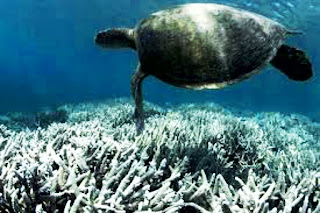The ocean and global warming
The ocean is a vast and complex ecosystem that covers over 70% of the Earth's surface. It is home to an estimated 230,000 known species of plants and animals, and it plays a vital role in regulating the Earth's climate.
The ocean produces about half of the oxygen we breathe, and it absorbs about 25% of all carbon dioxide emissions from the atmosphere. This helps to mitigate the effects of climate change, but it also means that the ocean is warming at a faster rate than the rest of the planet.
The increasing temperature of the ocean is causing a number of changes, including:
• The loss of sea ice
• The acidification of the ocean•
• The bleaching of coral reefs
• The movement of fish populations
• The spread of invasive species
These changes are having a significant impact on marine ecosystems, and they are also affecting coastal communities.
For example, the loss of sea ice is making it easier for storm surges to reach coastal areas, and the acidification of the ocean is making it more difficult for some marine organisms to survive.
A new article in Nature highlights the growing threat of marine heatwaves (MHWs). MHWs are extreme warm water events that can have a devastating impact on marine ecosystems. They can cause the death of fish and other marine life, and they can also damage coral reefs and other important habitats.
The frequency, duration, and intensity of MHWs have been increasing in recent decades, and this trend is expected to continue as the Earth continues to warm. This is a serious threat to marine ecosystems, and it is also likely to have a significant impact on coastal communities.
In conclusion, the ocean is a critical part of the Earth's climate system, and it is facing a number of challenges as a result of climate change. These challenges are already having a significant impact on marine ecosystems, and they are likely to become more severe in the future.
Here are some predictions about the future of the ocean:
• The ocean will continue to warm, acidify, and lose sea ice.
•Marine heatwaves will become more frequent, longer, and more intense.
•Coral reefs will continue to bleach and die.
•Fish populations will shift, and some species will become extinct.
•Coastal communities will be increasingly vulnerable to flooding and other climate-related disasters.
It is important to take action to mitigate climate change and protect the ocean. This includes reducing greenhouse gas emissions, investing in renewable energy, and protecting marine ecosystems. By taking action now, we can help to ensure a healthy ocean for future generations.
What You Can Do to Help
There are many things you can do to help protect the ocean from climate change. Here are a few ideas:
• Reduce your carbon footprint by driving less, using less energy, and eating less meat.
•Support businesses that are committed to sustainability.
•Get involved in local efforts to protect the ocean.
•Educate others about the importance of the ocean and the threats it faces.
• Write your representatives and encourage their participation
Every little bit helps. By taking action, we can all make a difference for the ocean.
-Unlikely Buddha



Comments
Post a Comment